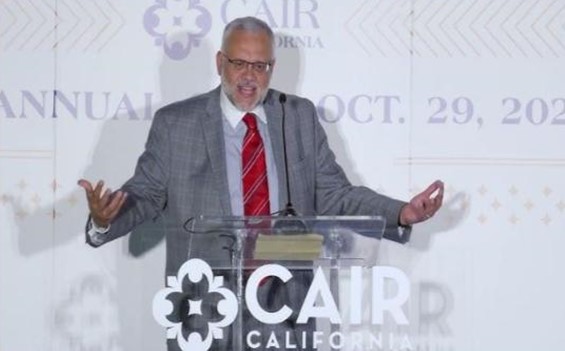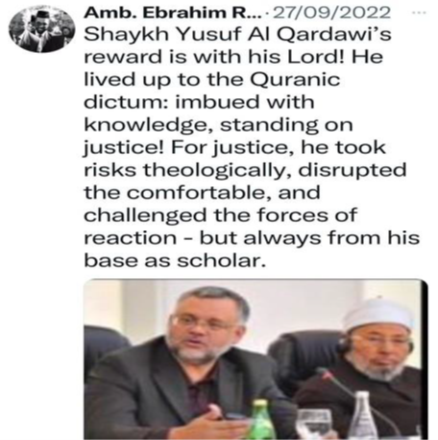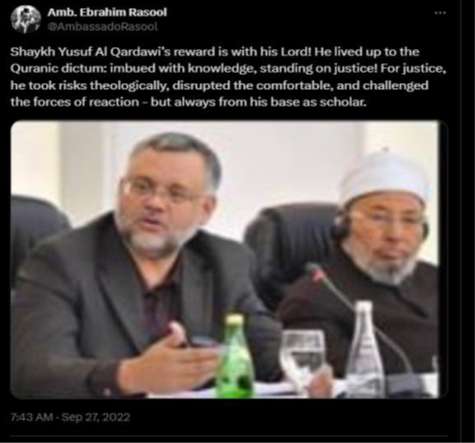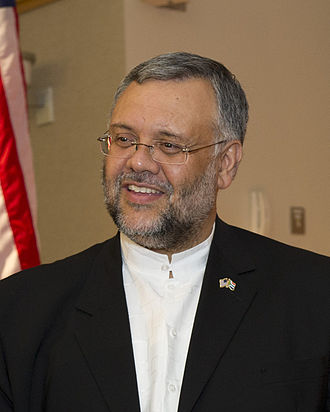Camouflaging Global Islamic Interests in Washington as South African Economic Upliftment:
Why the Reappointment of South African Ambassador Ebrahim Rasool Actually Matters Globally
by Irina Tsukerman
Preamble
Ties to Islamic Extremism, “Lawfare” Against Israel, and Critique of Donald Trump
Over the past several years, South Africa has emerged as a hub of political and financial support for certain extremist Islamic causes, despite its geographical distance from the Middle East. Key government officials and activists have steered foreign policy, public opinion, and on-the-ground fundraising efforts in ways that critics see as providing implicit or explicit support for militant groups such as Hamas, as well as creating close ties to Muslim Brotherhood-linked networks.
Prominent among these individuals is South African Ambassador to the United States Ebrahim Rasool, a former Western Cape Premier and now two-time South African Ambassador to Washington. Rasool has met repeatedly with figures aligned to the Muslim Brotherhood, helped coordinate conferences with the International Union of Muslim Scholars (IUMS A listed Terrorist Organisation – Founded in 2004 by Sheik Yusuf Al- Qaradawi), and been instrumental in publicizing legal campaigns against Israel in international forums in support of the Muslim Brotherhood and its ideology.
Naledi Pandor, during her tenure as Foreign Minister, also contributed to South Africa’s overtly pro-Palestinian positioning, which included strong condemnation of Israel at the United Nations and support for “lawfare” strategies at the International Court of Justice. Other activists in Rasool’s orbit include Sheikh Ibrahim Gabriels, a leading figure in the Al-Quds Foundation, and Sheikh Mufti Abdul Khaleq Ali, both of whom have participated in delegations aimed at consolidating South African backing for Hamas-linked efforts.
Certain influential figures within the broader ANC and activist community have facilitated these relationships. Ronnie Kasrils, an ANC veteran, has long advocated for a hardline approach against Israel, and Naeem Jeenah, affiliated with think tanks promoting anti-Zionist perspectives, has shaped public discourse aligning South Africa with militantly anti-Israel positions. Imtiaz Sooliman, founder of the Gift of the Givers, has been called out by detractors for partnering with or supporting Palestinian factions that educated and reliable critics classify as terror-linked. Their collective efforts often manifest in high-profile fundraising events, public protests, and diplomatic interventions that, according to observers, overshadow any concerns about Hamas’s violence in favor of a narrative solely condemning Israeli actions. These interconnected individuals and groups have, in turn, bolstered global efforts to isolate Israel diplomatically while, in some cases, glossing over or even legitimizing extremist elements.
South Africa’s current foreign policy direction has raised significant alarm among observers and analysts who argue that the country’s stance on Israel, alongside its relationships with questionable regimes, poses a serious challenge to global stability. Critics point to Pretoria’s increasingly “toxic” position on Israel, characterized by the South African government’s unyielding support for international campaigns against the Jewish state.
This policy has gone hand in hand with South Africa’s openness to aligning with, and endorsing, entities and governments widely recognized as sponsors of terror and abusers of fundamental human rights.
Within this framework, some analysts perceive South Africa’s governing elite as one of the greatest external threats to both Israel and the United States, after the primary threats themselves, for their willingness to back militant organizations and authoritarian regimes. Detractors claim that such backing not only undermines democratic norms and fosters international instability, but also sets a dangerous precedent legitimizing terror. Against this backdrop, former Western Cape Premier and two-time South African Ambassador to Washington, Ebrahim Rasool, emerges as a central figure. His personal ideology and high-level diplomatic engagements have become emblematic of South Africa’s broader pivot toward radical elements and alliances at odds with Western security interests.
- Introduction
Ebrahim Rasool is a South African politician and diplomat whose career trajectory has taken him from anti-apartheid activism to two separate terms as South Africa’s ambassador to the United States. Born on July 15, 1962, in Cape Town, he served as Premier of the Western Cape, was a member of the National Assembly, and first served as Ambassador to Washington from 2010 to 2015. He was reappointed to the same ambassadorial position in late 2024.
Although he is widely recognized for his role in the struggle against apartheid, Rasool’s record and public statements reveal deep ties to global Islamic networks aligned with the Muslim Brotherhood, particularly through his personal relationship with the late Sheikh Yusuf Al-Qaradawi. His alignment with Hamas-related narratives and promotion of “lawfare” against Israel at the International Court of Justice (ICJ) have drawn scrutiny. Further controversy stems from his forceful criticism of former U.S. President Donald Trump, which raises questions about his capacity to navigate U.S.-South African relations, especially under a renewed Trump administration.
This report provides a comprehensive overview of Rasool’s background, his affiliations with extremist Islamic interests, his endorsement of anti-Israel legal campaigns, and his outspoken critique of Donald Trump, drawing on extensive references and source material.

- Rasool’s Political Rise and Key Appointments
Rasool’s early involvement in political activism included membership in the United Democratic Front (UDF), the ANC’s internal mass movement during apartheid, and the founding of the “Call of Islam” in 1984 to mobilize South African Muslims into the anti-apartheid struggle [1].
After apartheid ended, he rose through government ranks:
• Western Cape Executive Council (MEC): He served in portfolios such as Health, Social Services, Finance, and Economic Development [2].
• Premier of the Western Cape (2004–2008): Rasool was appointed amid the ANC’s drive to win over the Coloured vote in a racially fragmented province [2].
• Member of the National Assembly (2009–2010): Before his first stint as Ambassador, Rasool briefly served at the national parliamentary level [2].
• First Appointment as Ambassador to the U.S. (2010–2015): Under President Jacob Zuma, Rasool served during President Barack Obama’s tenure in the White House [1].
Following a period as chairperson of the Development Bank of South Africa, Rasool was reappointed Ambassador to Washington in November 2024, just as the U.S. stood on the brink of another Trump presidency, creating a vastly different climate from his initial ambassadorial term [3].
- Ties to the Muslim Brotherhood and Islamic Extremism
3.1. Relationship with Sheikh Yusuf Al-Qaradawi
Rasool openly acknowledges his debt to Sheikh Yusuf Al-Qaradawi, a widely recognized ideological pillar of the Muslim Brotherhood who founded the International Union of Muslim Scholars (IUMS) [1]. Al-Qaradawi is known for providing spiritual legitimation for terrorist groups such as Hamas. He also spearheaded the Union of Good, which was later designated by the U.S. Department of the Treasury for channeling funds to Hamas.
During a key three-day meeting in Doha in 2012, Al-Qaradawi personally tasked Rasool with developing an Islamic jurisprudence (fiqh) for Muslim minorities in societies they do not control. Rasool described this encounter as “one of the most memorable” of his life [1]. Their close association underscores Rasool’s role in extending Al-Qaradawi’s ideological reach into minority-Muslim contexts.
3.2. Muslim Minority Leaders Colloquium (2013)
In March 2013, Rasool co-convened the “Living Where We Don’t Make the Rules: A Muslim Minority Leaders Colloquium” in partnership with Al-Qaradawi’s IUMS [4]. The colloquium proposal and communiqué described how Muslim communities outside Muslim-majority countries could mobilize politically and socially, using South Africa’s anti-apartheid transition as a guiding paradigm. Ibrahim El-Zayat, a prominent figure linked to the Muslim Brotherhood in Europe, co-convened the event [4].
This colloquium was critical in shaping Rasool’s continued theological and political engagement, culminating in the May 2022 publication of Living Where We Don’t Make the Rules: A Guide for Muslim Minorities, which operationalizes many of Al-Qaradawi’s directives [5].
3.3. Engagement with Hamas-Aligned Missions
In late May 2024, a significant delegation from the IUMS, led by Dr. Ibrahim Al-Zayat (whose Muslim Brotherhood ties led to his removal from communal posts in Germany [6]), visited South Africa to thank the government for its involvement at the ICJ against Israel [7]. The delegates met with high-level politicians, including President Cyril Ramaphosa, then-Foreign Minister Naledi Pandor, and Rasool (who at the time chaired the Development Bank of South Africa) [7].
They also engaged prominent South African Muslim activists, such as Sheikh Mufti Abdul Khaleq Ali and Sheikh Ibrahim Gabriels of the Al Quds Foundation. Before leaving, the delegation conferred with South African businessmen to discuss funding the “Palestinian cause” [7]. This visit underscored Rasool’s pivotal role in harmonizing Muslim Brotherhood objectives with South African political and economic platforms.
3.4. Support for Palestinian Militancy and Silence on Hamas Terror
Rasool consistently draws parallels between apartheid South Africa and Israel, labelling Israel an “apartheid state” committing “genocide” [1]. While he has never overtly declared support for Hamas, his public rhetoric, which invariably focuses on alleged Israeli aggression, omits any acknowledgment of Hamas’s extensive terror operations, including suicide bombings, rocket attacks, and, most recently, the brutal attacks of October 7, 2023 [8]. Critics accuse Rasool of providing tacit ideological cover to Hamas.
Rasool’s involvement in fundraising efforts aligned with Hamas’s Ministry of Health in Gaza further underlines his proximity to militant agendas. For instance, on March 30, 2019, Rasool spoke at a fundraising dinner in Cape Town, also attended by senior Hamas official Basem Naim and other local Islamist figures, to support Hamas’s “March of Return” [1]. According to participant reports, Rasool encouraged equipping “brothers and sisters for a war that is surely coming” [1].
- Endorsement of “Lawfare” Against Israel: The ICJ Case
South Africa’s petition to the International Court of Justice (ICJ), accusing Israel of genocide and crimes against humanity, was filed in 2024. Rasool endorsed this move, lauding it as an act of “enormous integrity” [1]. He publicly stated:
“We have handed in our memorials to the ICJ, we have placed on record all the evidence we have of genocide, now let us try the legal case against Israel, and let civil society pick up the megaphones.”
—Ebrahim Rasool [1]
This approach effectively internationalizes the Palestinian “resistance,” aligning with the global Islamic agenda advocated by Muslim Brotherhood-aligned organizations. It also dovetails with the ANC government’s openly pro-Palestinian stance. Critics argue that Rasool’s leadership in this regard positions South Africa as a legal testing ground for anti-Israel measures spearheaded by extremist networks.
- Rasool’s Critique of Donald Trump
5.1. Undiplomatic Social Media Attacks
While serving in non-diplomatic roles after his first ambassadorship, Rasool regularly took to X (formerly Twitter) to criticize Donald Trump. In April 2020, Rasool chastised journalists for tolerating Trump’s “insults and abuse,” urging them to boycott Trump’s press briefings altogether [9]. On June 2, 2020, he equated Trump’s conduct to fascism and suggested “imbleachment,” playing on the president’s controversial comments about using disinfectants for COVID-19 [9].
5.2. Comparing Trump to Hitler and a “Fascist Leader”
Rasool’s commentary escalated by suggesting that putting the Bible in the “hands of fascists” is reminiscent of Hitler-era propaganda [9]. These remarks stand in stark contrast to typical diplomatic circumspection and risk alienating potential allies should a Trump administration return to power.

- 5.3. Diplomatic Repercussions upon Reappointment
By November 2024, Rasool had been reappointed Ambassador to Washington just weeks before the inauguration of “Trump II” [3]. Observers questioned how effectively he could operate given his prior public hostility. Rasool admitted that he would need to adopt a transactional approach:
“I need to speak in their language of transnationalism. To Obama I spoke the language of solidarity, now I must transform suspicion into transaction.”
—Ebrahim Rasool [1]
Nevertheless, critics point to his track record of equating Trump with Adolf Hitler and question whether such a pivot can be reconciled with the standard demands of ambassadorial decorum.

- Impact on U.S.-South African Relations
6.1. Concerns over AGOA and Economic Fallout
Rasool fully acknowledges South Africa’s reliance on the African Growth and Opportunity Act (AGOA), which grants duty-free access to the U.S. market for over 2,000 South African exports, supporting an estimated 250,000 jobs [1]. Meanwhile, his vehement anti-Israel lobbying and inflammatory rhetoric risk damaging U.S.-South African bilateral ties, especially under an administration deeply aligned with Israel.
6.2. U.S.-South Africa Bilateral Relations Review Act (2024)
In February 2024, the “U.S.-South Africa Bilateral Relations Review Act” was introduced, highlighting South Africa’s “history of siding with malign actors, including Hamas.” It further cites ANC leaders’ anti-Israel rhetoric following the attacks of October 7, 2023, and warns of significant scrutiny of U.S.-South Africa relations [10]. Rasool’s role in shaping Pretoria’s foreign policy and his personal relationships with extremist networks could become a focal point for Congress when deciding the future of trade privileges and other bilateral programs. - Domestic Criticism and “State Capture” Allegations
Back in South Africa, Rasool’s critics assert he is part of a small circle of radical Islamist figures (such as Naeem Jeenah, Naledi Pandor, Ronnie Kasrils, Mohammed and Zane Dangor and Imtiaz Sooliman) said to “capture” South African foreign policy to serve global Islamic priorities rather than national economic interests [1]. Observers note how Rasool, during his tenure as Premier of the Western Cape, allegedly favored Muslim business networks.
With joblessness above 30%, 27,000 reported murders a year and ongoing economic turmoil, his promotion of legal warfare on Israel while simultaneously trying to protect AGOA privileges places him at odds with many in the ANC who worry about potential American trade retaliation. Yet his reappointment underscores the ANC’s trust that Rasool, despite his controversial entanglements, can navigate these diplomatic landmines and preserve U.S.-South African economic ties. - Conclusion
Ebrahim Rasool stands at the nexus of multiple tensions: a post-apartheid liberation legacy, an Islamist worldview guided by the late Sheikh Yusuf Al-Qaradawi, and the demands of realpolitik in a U.S.-South African relationship under strain. His close ties to Muslim Brotherhood-affiliated networks, tacit alignment with Hamas narratives, and advocacy for “lawfare” against Israel create friction with U.S. foreign policy objectives, especially regarding America’s longstanding alliance with Israel and its broader war on extremist ideologies.
Simultaneously, his unwavering, and sometimes hyperbolic, critiques of Donald Trump call into question his ability to maintain a transparent or truthful functional diplomatic relationship with a returning Trump administration. For American policymakers, Rasool’s reappointment invites a closer look at South Africa’s foreign policy trajectory and whether his presence in Washington could embolden or facilitate anti-Western sentiment. For South Africa, the stakes are equally high, as the country relies on U.S. trade benefits and international goodwill to stabilize its fragile economy.
Ultimately, how Rasool balances his personal ideological commitments with South Africa’s urgent economic and geopolitical interests remains a critical question. His ambassadorship demands scrutiny from both sides, as it could redefine U.S.-South African relations for years to come.


- References –(S-Z)
[1] Camouflaging Global Islamic Interests in Washington as South African Economic Upliftment: Why the Reappointment of South African Ambassador Ebrahim Rasool Actually Matters Globally (2024), Middle East Forum’s FWI Research.
Full PDF Report:
https://www.meforum.org/fwi/fwi-research/south-africas-terror-tied-ambassador-returns-to-washington
[2] Wikipedia Entries on Ebrahim Rasool.
Link:
https://en.wikipedia.org/wiki/Ebrahim_Rasool
[3] Dentlinger, L., DIRCO confirms Ebrahim Rasool returning to US for second stint as SA ambassador, 12 November 2024, Eye Witness News (EWN).
Link: https://www.ewn.co.za/dirco-confirms-ebrahim-rasool-returning-to-us-for-second-stint-as-sa-ambassador/
[4] Muslim Minority Leaders Colloquium (Conference Documents), World for All Foundation.
Invitation PDF: https://worldforall.org/wp-content/uploads/2020/04/MMLC-Invitation.pdf
• Conference Proposal: https://worldforall.org/wp-content/uploads/2020/04/MMLC-Conference-Proposal.pdf
• Communiqué: https://worldforall.org/wp-content/uploads/2020/04/MMLC-Communique.pdf
• Paris Programme: https://worldforall.org/wp-content/uploads/2020/04/MMLC-Paris_Programme.pdf
[5] Rasool, Ebrahim (May 2022). Living Where We Don’t Make the Rules: A Guide for Muslim Minorities.
Publisher: Claritas Books.
Link:
https://www.claritasbooks.com/living-where-we-dont-make-the-rules
[6] Egypt Today staff, Germany’s Central Muslims Council strips Muslim Brotherhood figure Ibrahim Zayat of posts: Reports, 19 September 2022, Egypt Today.
Link:
https://www.egypttoday.com/Article/1/119293/Germany%E2%80%99s-Central-Muslims-Council-strips-Muslim-Brotherhood-figure-Ibrahim-Zayat
[7] International Union of Muslim Scholars (IUMS) May 2024 Delegation Accounts (Arabic).
Link:
https://iumsonline.org/ar/ContentDetails.aspx?ID=35401
[8] U.S.-Designated Terrorist Organization Hamas and Related Reports.
(No direct link provided in source text other than references below.)
[9] Ambassador Rasool X (Twitter) Account, various posts (7 April 2020; 2 June 2020).
Link:
https://x.com/ambassadorasool
[10] U.S.-South Africa Bilateral Relations Review Act (Introduced 6 February 2024), agoa.info.
Full PDF Text:
https://agoa.info/images/documents/16433/bills-118hr7256ih.pdf
[11] Donald M. Gips, What Rasool told the Americans, 17 January 2011, Politicsweb.
Link:
https://www.politicsweb.co.za/documents/what-rasool-told-the-americans
[12] Channel Islam International Radio, Interviews with Ebrahim Rasool (multiple dates).
Link:
https://radioislam.org.za/a/ebrahim-rasool-set-to-return-to-us-as-sa-ambassador/
[13] CT Intifada Instagram Account, 29 November 2024 (Video Coverage of Protests at U.S. Consulate).
Link: https://www.instagram.com/capetown_itf/reel/DA80NkaIHCY/
[14] Elitsha News, COSATU and PSC Call for Boycott of US Companies, by Chris Gilili, 29 November 2024.
Link:
https://elitshanews.org.za/2024/11/29/cosatu-and-psc-call-for-boycott-of-us-companies/
[15] Jerusalem Centre for Public Affairs (JCPA), What Is Behind South Africa’s Anti-Israel Lawfare Campaign? (2024) and related articles.
Link:
https://jcpa.org/article/what-is-behind-south-africas-anti-israel-lawfare-campaign/
[16] Institute for the Study of Global Antisemitism and Policy (ISGAP).
Link:
https://isgap.org/wp-content/uploads/2024/11/SA_Report_Final_121124-2.pdf
[17] Foundation for Defense of Democracies (FDD) Reports on Hamas-South African Support Network.
Link:
https://www.fdd.org/analysis/op_eds/2024/10/14/south-africa-is-not-pro-palestinian-its-pro-hamas
[18] Times of Israel (Blogs), multiple posts on terror financing from South Africa.
Sample Link:
https://blogs.timesofisrael.com/gifting-terror/
[19] South African Jewish Report (SAJR), coverage of Sooliman, Gift of the Givers, and allegations of support for Hamas.
Link:
https://www.sajr.co.za/humanitarian-icon-spouts-hate-speech-as-allegations-swirl/
[20] The Jerusalem Post, recent articles on South Africa, Hamas, and anti-Israel activism.
Link:
https://www.jpost.com/international/article-829360
[21] Lay of the Land (Online): The Genocide Nobody Talks About (2024).
Link:
https://layoftheland.online/2024/04/29/the-genocide-nobody-talks-about/
[22] BizNews, A very dark side to Sooliman’s Gift of the Givers by Marika Sboros.
Link:
https://irr.org.za/media/marika-sboros-a-very-dark-side-to-sooliman2019s-gift-of-the-givers-biznews
[23] JNS.org, Johannesburg to Host Global Anti-Israel Conference.
Link:
https://www.jns.org/johannesburg-to-host-global-anti-israel-conference/
[24] PoliticsWeb, Jewbaiting on October 7th and other commentary on Ronnie Kasrils, anti-Israel rallies, and Rasool’s background.
Link:
https://www.politicsweb.co.za/opinion/jewbaiting-on-october-7th


No responses yet